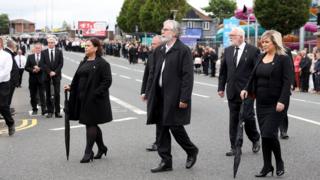 Image copyright
Pacemaker
Image caption
Sinn Féin's leader and deputy leader attended, along with former leader Gerry Adams (centre)
Image copyright
Pacemaker
Image caption
Sinn Féin's leader and deputy leader attended, along with former leader Gerry Adams (centre)
Deputy First Minister Michelle O'Neill has defended the attendance of several senior Sinn Féin politicians at the funeral of veteran republican Bobby Storey.
Ms O'Neill said the funeral had taken place "in accordance" with coronavirus guidelines.
She was among hundreds of mourners in west Belfast on Tuesday.
Current coronavirus regulations state a maximum of 30 people are allowed to gather together outdoors.
There has been widespread criticism of Ms O'Neill and her party colleagues who attended the funeral.
"It was all done in accordance with the guidelines," Ms O'Neill told the Irish News.
She said the cortege had a "maximum of 30 people in it" and that the service at St Agnes's Church had been "exemplary" in relation to social distancing and hygiene.
Inside the church only three mourners shared a pew, she said.
The Sinn Féin vice-president added: "Regrettably a considerable number of family members were unable to take part in the cortege as a result of current restrictions, like many other families who have been unable to properly grieve or mourn the loss of a loved one in a traditional way as a result of the Covid crisis.
"These restrictions have been very difficult for families who have lost a loved one and particularly those who lost a loved one during the period when society was in lockdown."
The Police Service of Northern Ireland (PSNI) said on Tuesday it would review footage of the funeral and "consider any suspected breaches of the Health Protection (Coronavirus Restrictions) Regulations NI 2020".
Image copyright Pacemaker Image caption A large crowd attended the funeralSinn Féin leader Mary Lou McDonald, Stormont's Finance Minister Conor Murphy, former leader Gerry Adams and Northern Ireland Assembly members (MLAs) Gerry Kelly and Martina Anderson also attended the funeral.
On Tuesday, NI Health Minister Robin Swann said no-one was exempt from the regulations.
Mr Swann said he hoped "this isn't the Dominic Cummings effect in Northern Ireland because quite frankly our health service can't afford it to be".
"There is no person, or position, or point of privilege that is above the guidance we had laid down, no one is immune from it," he said.
A number of other politicians have also voiced concern over the funeral.
Image copyright PA Media Image caption Health Minister Robin Swann said that no one is "above the guidance"In a tweet, Justice Minister Naomi Long, leader of the Alliance Party, said when the rule makers break the rules it is more hurtful "for all who made huge sacrifices to obey the regulations".
She said gathering in crowds "for any reason is dangerous".
SDLP leader Colum Eastwood said: "Today's [Tuesday's] display showed a blatant disregard for the sacrifices made by so many."
DUP East Londonderry MP Gregory Campbell said the "law must be upheld".
"No-one should expect to get a bye-ball because of their position," he said.
In the assembly, Traditional Unionist Voice leader Jim Allister said the executive's credibility had been undermined by the appearance of the deputy first minister and other MLAs "in flagrant breach, it would appear, of some of those regulations".
Social-distancing breaches
There have been a number of events which have been criticised for attracting crowds during the Covid-19 pandemic.
In May, a senior police officer said there had been social-distancing breaches at funerals in both the unionist and nationalist communities.
Earlier in June, protestors at Black Lives Matter rallies in Belfast and Londonderry were fined, while several hundred people took part in a "save our statues" rally at Belfast City Hall.
Image copyright PAcemaker Image caption Bobby Storey was previously chairman of Sinn Féin and a close friend of Gerry AdamsMr Storey died at the age of 64 following a period of illness.
He was considered the head of intelligence of the IRA for a period from the mid-1990s and was named as such under parliamentary privilege.
Security sources linked him to several major incidents, including the £26m Northern Bank robbery in 2004.

 5 years ago
812
5 years ago
812 

